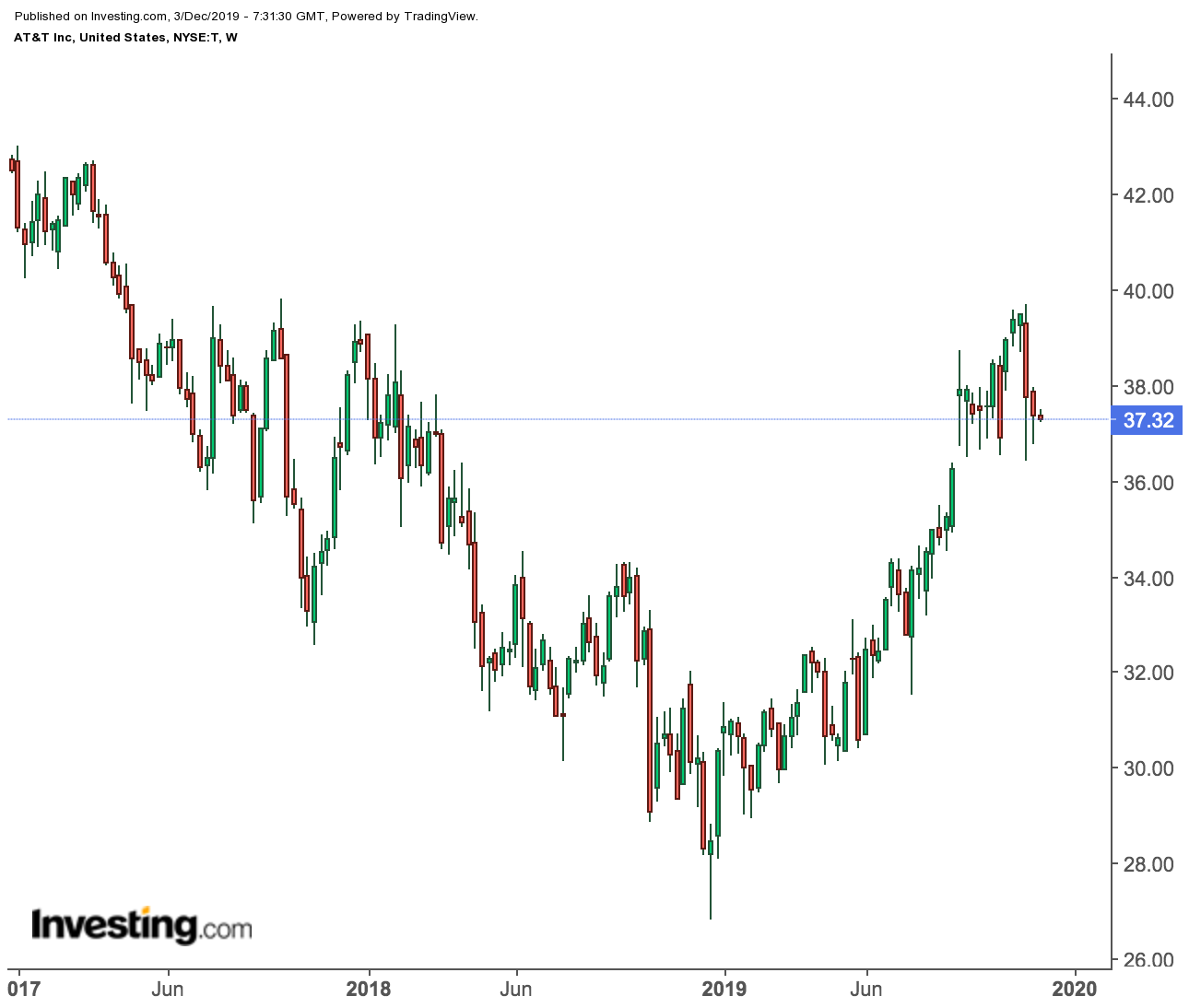Uxin shares drop 45% as predicted by InvestingPro’s Fair Value model
America’s largest telecom operator, AT&T (NYSE:T), has proved a profitable bet in 2019. Despite the worries about its future growth and the stiff competitive environment in which it’s operating, its shares, currently at $37.32, have gained about 31% this year, outperforming the benchmark S&P 500 Index's 24% rise.
However, this rebound, which partly reflects a favorable environment for dividend-paying stocks, doesn’t solve the fundamental challenges this telecom conglomerate is facing: how to produce growth when its core operations are struggling and how to manage its huge load of debt. 
The recent involvement of an activist investor, Elliott Management Corp., a hedge fund with a $3.2-billion stake in the company, has provided a lot of fodder to some analysts who are building quite a bullish case for AT&T.
After openly criticizing CEO Randall Stephenson for his blockbuster acquisitions, including its $85-billion deal to buy Time Warner assets, the hedge fund seems to have succeeded in pressuring the board to tweak its strategy and stay away from another mega acquisition.
AT&T’s “peace deal” with Elliott, an aggressive investment fund led by billionaire Paul Singer, includes a commitment to stock buybacks and a plan to appoint two new directors to its board. As part of this truce, AT&T also pledged to conduct a review of its portfolio and pay down debt from its 2018 takeover of Time Warner.
The telecom giant also agreed to separate the roles of chairman and CEO when Stephenson, age 59, retires. He has led AT&T since 2007 and had recently discussed stepping aside as soon as next year, according to a report in The Wall Street Journal.
A Long Bumpy Ride
The company’s three-year capital-allocation plan released in October also provided visibility and was liked by many analysts. The commitment to retire all of the debt acquired from its Time Warner purchase, along with a plan to spend 50%-70% of its free cash flow after dividend payments on share buybacks, are some of the moves which could propel AT&T’s stock higher and help the company to get back on a sustainable growth path.
But these future-focused details don’t hide the fact that AT&T is struggling in many areas of its business and that its turnaround still faces a long bumpy ride. In the third quarter, AT&T reported a profit of $3.7 billion, down 22% from the same period a year ago. Revenue declined 2.5% to $44.6 billion, showing a widespread weakness across its business units.
In the quarter, AT&T’s entertainment unit shed 1.4 million pay-TV customers, including 1.2 million satellite and fiber-optic-TV customers and 195,000 subscribers at AT&T TV Now, the online channel bundle once called DirecTV Now.
To deal with this perpetual shift of entertainment consumers to video-streaming providers, AT&T is launching its own service next year, HBO Max, by packaging content from its Time Warner assets, and the premium movie and TV brands it owns, such as “Friends.”
In a market which is getting crowded by new players seeking to challenge the dominance of Netflix (NASDAQ:NFLX), it’s hard to predict how well AT&T will fare. AT&T, however, expects the new service to reach 50 million domestic subscribers within the next five years as it competes directly with other media giants, such as Disney (NYSE:DIS), Apple (NASDAQ:AAPL) and Amazon (NASDAQ:AMZN).
Bottom Line
The rebound in AT&T’s stock this year is the result of a combination of factors, including high demand for dividend stocks, some improvement in its cash position and the involvement of an activist investor who has a reputation for pushing change in troubled firms in order to shore up their share values.
But that recovery, in our view, doesn’t yet guarantee a sustainable turnaround, just because of the very complex nature of the challenges AT&T is facing. For that reason, its stock remains a speculative bet.
That said, AT&T is one of the most widely-held stocks among institutional investors who have their eyes on the company’s hefty payout. At an annual yield of 5.46%, with a yearly payout of $2.04, when savings accounts are paying close to zilch, that attraction alone could be a big deciding factor to buy the embattled telecom behemoth's shares.
